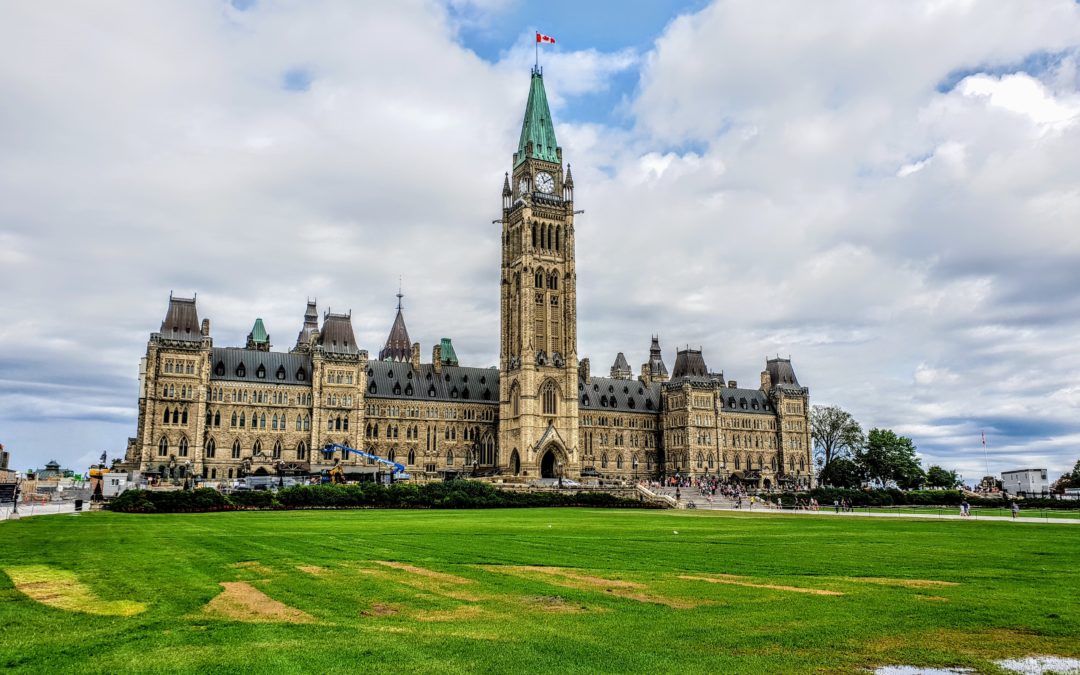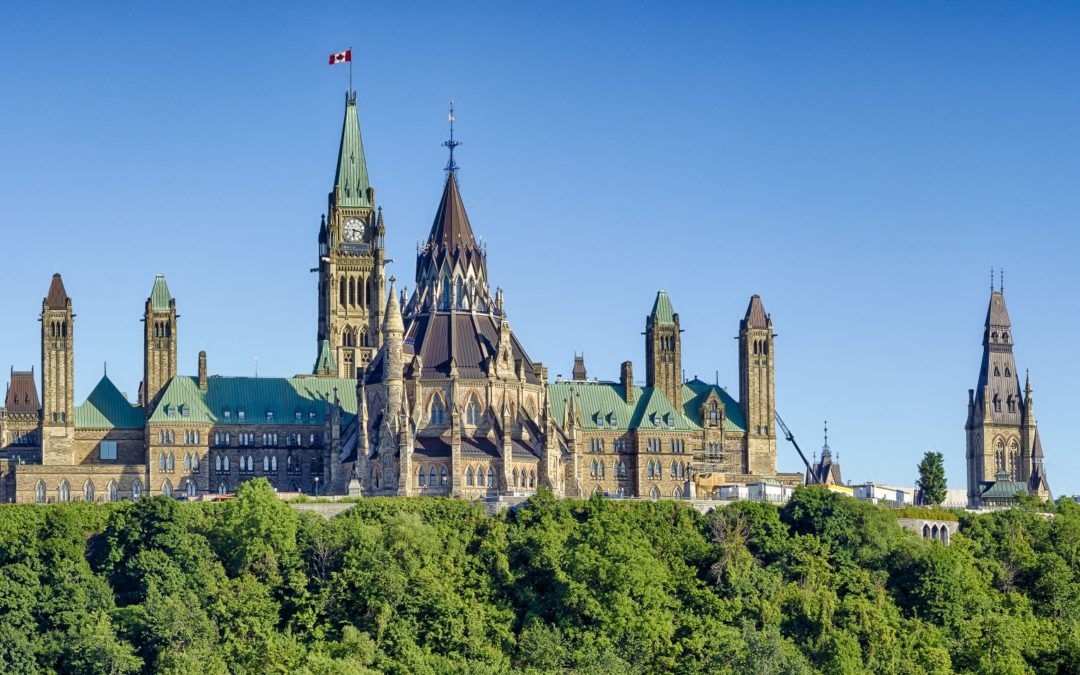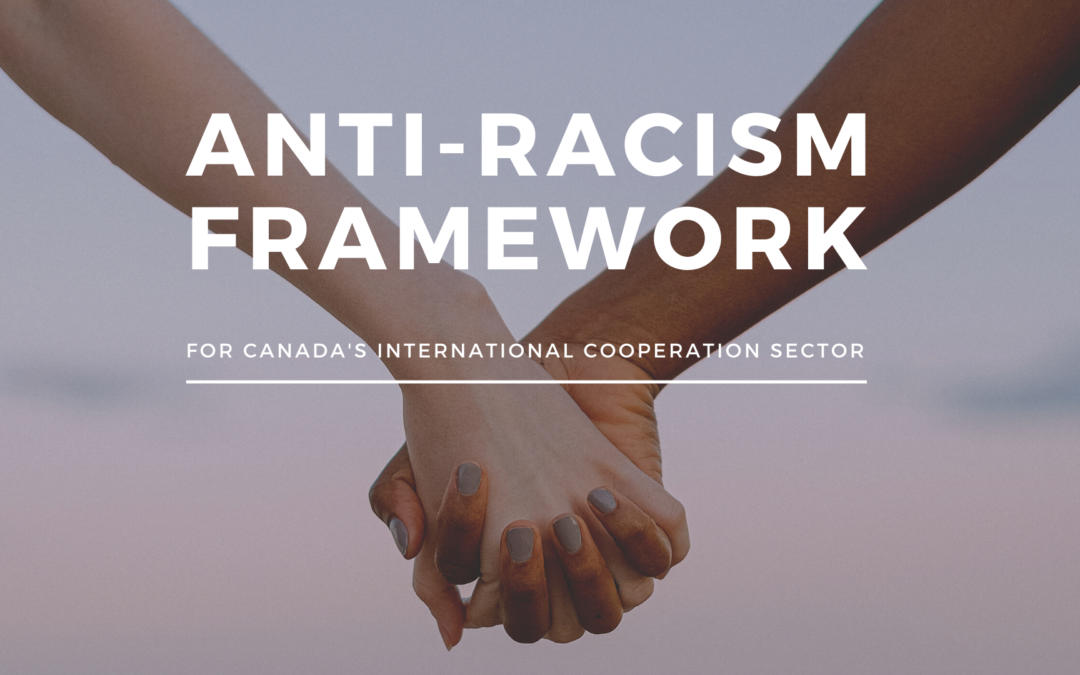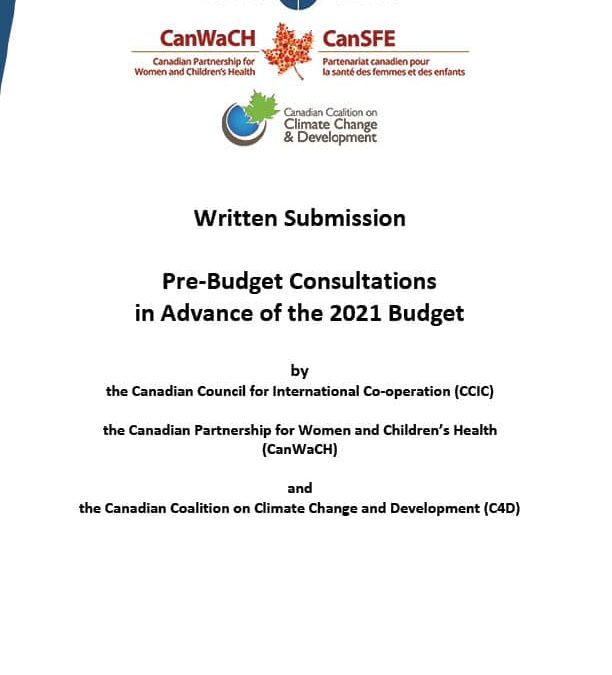by Cooperation Canada | Apr 30, 2021 | CPAG, News, Policy
Global Affairs Canada and Cooperation Canada are co-Chairs of the Civil Society Policy Advisory Group (CPAG), which aims to advance to achievement of objectives outlined in Canada’s Feminist International Assistance Policy (FIAP) and the related GAC CSO Partnership Policy. The group supports the implementation of the CSO Partnership Policy Implementation Plan, focused on nine action areas:
- Empowering women and girls, promote gender equality, and reach the poorest, most vulnerable and most marginalized as the most effective means to eradicate poverty
- Facilitating a safe and enabling environment for civil society
- Protecting human life and dignity
- Fostering CSO leadership in innovation
- Integrating the role of CSOs as independent actors into international assistance programming
- Establishing more predictable, equitable, flexible, and transparent funding mechanisms
- Fostering multi-stakeholder approaches to international assistance
- Engaging Canadians as global citizens in international assistance
- Promoting sustainability, transparency, accountability, and results
CPAG is comprised of GAC and CSO representatives specializing in the above-outlined action areas, but also representing sector diversity in terms of areas of professional specialization, organizational type and size, and geographic location, as well as individual identity factors such as gender, age, race, geographic and linguistic backgrounds etc. GAC Assistant Deputy Minister (ADM) for the Partnership for Development Innovation Branch oversees the strategic direction of the group, which continuously engages a broader set of sector experts to inform their work.
Building on commitments of membership rotation, inclusivity and diversity, CSO members of CPAG now invite CSO sector specialists to express interest in serving on CPAG for a two-year term. Interested colleagues are required to commit approximately up to 10 hours a month to ongoing work, and to attending bilingual quarterly calls. The group will at all times aim to ensure intersectional approach to all areas of work.
The Call for Expressions of Interest can be found here. Colleagues are asked to answer a set of questions to support the membership selection process, which will be conducted by current CSO members. The deadline to submit applications is the end of day 17 May 2021. Applications will be anonymized to minimize bias, but only fully completed forms will be considered. We are determined to ensure CPAG is a safe and inclusive environment for all. Section decisions will be made by June.
To learn more about CPAG and the CSO Partnership Policy, please click here. Thank you very much for considering contributing to this vital advisory group.
With best wishes,
CSO CPAG Members

by Cooperation Canada | Apr 19, 2021 | Feminist Foreign Policy, News, Policy, Responding to Covid-19
Keeping Canadians safe is the most important role of the government. That means eradicating COVID-19 from around the world, urgently addressing the climate crisis, and ensuring an equitable pandemic recovery. Our economy is global, our population is multicultural, and we cannot solve global challenges in isolation. Canada will not recover until the world recovers.
Today, the Government of Canada announced budgetary measures aimed at eradicating COVID-19. This includes $375 million towards the global pandemic response – a critical contribution that will save lives. Yet this modest figure stands in contrast with the Government’s commitments last year, amounting to an estimated $1.2 billion and does not reflect or respond to the dire humanitarian needs around the globe: with 97 million people pushed to extreme poverty and 270 million facing acute hunger. COVID-19 is not a fleeting crisis. It calls for political leadership and strategic investments to make up for the 25 years of human development progress lost in the first 25 weeks of the global pandemic. Today’s budget is a missed opportunity to demonstrate such political leadership.
Women and girls, marginalized communities and historically disadvantaged countries are bearing the brunt of the harshest economic, social, and health effects of the crisis. Securing their futures requires ambitious action. This is why the international development sector has been calling for the government to invest 1% of its COVID response to support the global response and recovery. Today’s Budget provides for $375 million in COVID-19 global response, encapsulated in a $1.4 billion increase in international assistance, spread over five years. Such an increase emerges as insufficient against the backdrop of the biggest global crisis in a generation and the need for long-term investments in mechanisms of global health, social protection and economic collaboration on which depends our ability to recover from COVID-19 and prevent and mitigate future crises.
Canada is currently contributing far below its global fair share and its international commitments, investing only 30 cents in international assistance for every 100 dollars in gross national income. Despite an increase last year, Canada continues to perform below the average of donors of the Organisation for Economic Co-operation and Development (OECD). Low levels of funding, exacerbated by unpredictable new allocations that follow political trends and media attention instead of the humanitarian needs and development strategies, are threatening the achievement of the government’s own Feminist International Assistance Policy.
Canadians understand the need for a bold budget with robust measures to address the crisis within and beyond our borders. While Canada grapples with its own vaccine roll-out, many lower-income countries have not received a single dose, endangering lives, and threatening the health and economic recovery everywhere.
“The COVID-19 pandemic has shown us how important it is to address global crises in a timely manner,” said Nicolas Moyer, CEO of Cooperation Canada. “Canada’s international development and humanitarian sector has been calling on the Government to commit to a strategic, long-term investment in global solutions to the multiple concurrent crises affecting us everywhere. This Budget missed an opportunity to answer those calls.”
Today was also not the day Canada presented a vision for addressing international climate challenges. Looking forward, the Government must tackle the climate crisis with determination. This means allocating Canada’s fair share of the global climate finance commitments, which corresponds to $1.8 billion in annual contributions, on top of the current international assistance levels. Our global crises cannot be solved in isolation. Climate adaptation and mitigation, humanitarian interventions and development efforts are mutually reinforcing and as such deserve comprehensive and strategic investments that match the severity and the urgency of the crises we are facing everywhere.
Canada has an opportunity to do better later this year at the G7 Summit and the Paris Climate Conference (COP21) with a chance to invest in progressive and principled global development, that is in everyone’s interest. It is time to commit meaningfully to effective efforts to build back healthier, safer, more equitable and sustainable communities for us all.
Media Contact
Kat Guerin
Communications Manager
[email protected]
About Cooperation Canada
Cooperation Canada brings together and advocates for Canada’s international development and humanitarian organizations by convening sector leaders, influencing policy and building capacity. Together, we work with partners both inside and outside Canada to build a world that’s fair, safe and sustainable for all.

by Cooperation Canada | Mar 25, 2021 | News, ODA Advocacy, Policy
In a virtual town hall on foreign policy on March 16, Conservative Party Leader Erin O’Toole shared his vision for Canada’s engagement on the international stage. Cooperation Canada welcomes his reversal during this event of a Conservative Party election platform policy during the last federal election to cut Canada’s official development assistance (ODA). Canada is already contributing less than its fair share globally: Canada’s ODA levels are below those of other peer countries, currently at their lowest point in 50 years.
“As the COVID-19 pandemic ravages lives, devastates economies and increases inequalities around the globe, Canada has an important role to play in contributing to a global recovery that is inclusive for everyone,” said Nicolas Moyer, CEO of Cooperation Canada. “Canada must do more on the global stage, not less, if we are to see the kind of global recovery that reflects Canada’s values and principles of human rights, equality and inclusive progress.”
As the current crisis shows, our economy is global, our population is multicultural, and we cannot solve global challenges in isolation. Canada will not recover until the world recovers. Mr. O’Toole recognized this and assured Canadians that the Conservative Party’s approach to global engagement would be predictable, strategic and impact-oriented, while enabling civil society actors to support the most marginalized communities through equitable partnerships in Canada and abroad.
We welcome these vital positions shared by Mr. O’Toole, including his pledge to reform the Canada Revenue Agency’s severely outdated ‘direction and control’ regulations, which hinder the ability of Canada’s charitable actors to establish equitable partnerships with communities and actors in Canada and abroad. Senator Ratna Omidvar’s Bill S–222, tabled before the Senate, represents a collectively devised solution to this urgent issue for Canadian charities, including those working internationally.
Under the Together Project, Canada’s international cooperation sector is calling on all parties to commit to long-term increases of ODA and global climate finance mechanisms needed to meet our country’s fair share for global solutions that will benefit us all. More specifically, our sector is asking that 1% of Canada’s COVID-19 response and recovery budget be allocated towards global solutions. We thank the Hon. Erin O’Toole for engaging in a conversation with us and look forward to further discussing these urgent yet strategic investments.
***
Cooperation Canada with the Business Council of Canada, Canadian Chamber of Commerce, Canadian Global Affairs Institute, Canadian International Council and Global Canada convened the March 16 Foreign Policy Town Hall discussion with the leader of the Conservative Party.
We look forward to convening similar conversations in the future as we strengthen collective forums for inclusive discussions on key global challenges. As our town hall has demonstrated, the interlinkages between all aspects of Canada’s global engagement, including international trade, diplomacy, development assistance and security, are crucial in solving global challenges.

by coopcanada2020 | Jan 21, 2021 | News, Policy
This week, the Prime Minister’s Office issued supplementary mandate letters, addressing the heightened expectations Canada’s Ministers face during the global pandemic. Responsibilities listed in these supplementary mandate letters do not replace commitments listed in the 2019 letters – which Coperation Canada (CCIC at the time) analyzed.
Cooperation Canada is proposing below an analysis of the new supplementary letters and what they might signal to the international cooperation sector. The below is a summary analysis by Cooperation Canada from the perspective of the international cooperation sector and should by no means be understood as a comprehensive summary of policy priorities of the current Government.
General trends
The mandate letters issued to the newly reshuffled cabinet are aligned with the federal government’s positions so far. The four areas of focus remain, as already announced, those of (i) public health, (ii) strong economic recovery, (iii) cleaner environment, and (iv) fairness and equality. While responding to the direct (public health) and indirect (in this case primarily economic) repercussions of COVID-19, Ministers are advised to scale up the ambition of programs aimed at COVID response and early recovery while refraining from budgetary moves that would have long-lasting fiscal effects long after the pandemic. On a positive note, the Government does not seem to have abandoned the non-COVID priorities of environmental sustainability nor that of equitable societies.
Economy and ODA repercussions
With the economic recovery (predictably) being on top of the Government’s list, Finance Minister Freeland’s role is more important than ever. Her supplementary letter instructs her to “preserve Canada’s fiscal advantage” and “use whatever fiscal firepower is needed in the short term” but also to “avoid creating new permanent spending”. This sends a clear message that budgetary increases obtained during COVID should not be considered permanent. With the Government increasing Canada’s fiscal deficit as a result of the global crises, no budgetary increases in this period can be reasonably expected to expand the fiscal space for specific budget items in the long run.
However, perhaps not all social justice lessons will be forgotten after the recovery. The supplementary letter encourages Freeland to tax the wealthy and multinational corporations while working within the broader community of the Organisation for Economic and Co-Operation and Development (OECD) to strike down on tax evasion and avoidance.
Canada’s global engagement
The current government’s emphasis on a sustainable economic recovery is not limited to domestic policy. Supplementary letters to Ministers Freeland, Garneau, and Gould call for reinforced efforts to ensure “vaccines, therapeutics, and strengthened health systems” at home and abroad. The newly appointed Minister Garneau is particularly called upon to strengthen multilateral approaches to crises such as the current pandemic. What this means exactly, however, remains unclear in the present context of a fragmented geopolitical system and competing foreign policy visions between multiple “donor country” blocks.
Minister Gould’s supplementary mandate letter is interesting for the international cooperation sector considering the encouragement to: “increase investments in international development to support developing countries on their economic recoveries and resilience”. This is an echo of a similar commitment in the Fall Throne Speech. Given that Canada’s Official Development Assistance (ODA) levels are below the OECD donor average and at the country’s historical low in half a century, this objective emerges as a rather complex one. Canada’s ODA levels, which in the last fiscal year represented mere 0.27% of the country’s gross national income (GNI) are a far cry from the international commitment of 0.7% as well as any credible expectations of Canada’s contribution to solving key global challenges that affect us everywhere.
Green economy
The Government’s commitments to green economy domestically do not seem to reference Canada’s commitments to global finance, which as the recent C4D report shows, are almost entirely allocated to multilateral organizations on a loan basis. Hopefully, the recent approval of Bill C-12: the Net Zero Emissions Accountability Act is a signal that Canada takes its responsibility to mitigate climate change effects seriously so it would be logical for the same ambition and drive will be applied on the global stage.
Similar efforts to take responsibility for the safety and well-being of current and future generations are evident in mandate letters that, for example, call for a climate lens to all government decision-making (Treasury Board letter), planting 2 billion trees, reduction of emissions within Canada’s farming sector (Agriculture and Agri-Food letter), and support Canada’s clean energy transitions including through tax breaks (of 50%) to companies developing and manufacturing zero-emission technology (Finance letter).
Fair and equal societies
The current government seems to be reacting to the uprisings in Canada and elsewhere on the continent, calling on deliberate efforts to address and dismantle systemic racism. Many ministerial priorities focus on expanding the gender equality considerations to include identity factors such as race, (dis)ability etc.
Gender equality
Part of this agenda is aligned with previously announced efforts to further enable transformative efforts towards gender equality. The present government is reacting to the fact that women are bearing the brunt of the current pandemic response, which is why numerous letters focus on improving Canada’s education system, child care structures, and women’s access to gainful employment and services. The Deputy Prime-Minister is expected to develop an Action Plan for Women in the Economy (which should, like always be intersectional and holistic). Other agenda items, across various ministerial letters in this area, include providing shelter and transition housing to marginalized and vulnerable groups, such as women victims of violence, improving country-wide early learning and childcare systems, and supporting progress towards gender equality in Canadian companies. The pandemic, however, is clearly not being used as an excuse to hinder ongoing policy processes such as that of the consultations for the development of Canada’s Feminist Foreign Policy, which started in November 2020, and re-appears in the letter to the newly appointed Minister Garneau.
Racial justice
Racial justice appears more prominently as a policy objective in the latest round of ministerial mandate letters. This is particularly evident in the supplementary letters to Ministers of the Treasury Board, Diversity and Inclusion and Youth, Women and Gender Equality and Rural Economic Development, Employment, Workforce Development and Disability Inclusion, Crown – Indigenous Relations, International Development, and Finance. Each of these Ministers has been asked to integrate diversity and inclusion in their work and/or elaborate sector-specific strategies that integrate these considerations. Letters also explicitly name the problem, referring to, as it is the case of Minister Chagger’s letter “systemic discrimination and unconscious bias in our country, including anti-Black racism”.
The most notable agenda item related to the Government’s heightened focus on diversity and inclusion is perhaps that of revising Canada’s gender-based analysis (GBA+), which all ministries have already been mandated to integrate. GBA+ should be reassessed as an analytical tool that allows for (i) greater data disaggregation to account for other identity factors such as race, (dis)ability, genders, indigeneity etc. Such an approach signals readiness to build on the progress made towards more gender-equal policy approaches and expand the definition of “equitable” to include other identity factors. This commitment is further substantiated by specific calls to advance reforms addressing “systemic inequities in the criminal justice system” as well as updated the Employment Equity Act requires. Diversity and inclusion are also agenda items for Canada’s Public Service, with the Treasury Board expected to form a Centre for Diversity to support public service bodies in their work in this area.
Reconciliation
The supplementary mandate letters rightly highlight the importance of the reconciliation with Indigenous peoples, particularly prominent in the calls to accelerate the implementation of the National Action Plan in response to the National Inquiry into Missing and Murdered Indigenous Women and Girls’ Call for Justice, as well as accelerate the work of the Truth and Reconciliation Commission’s Call to Action. Lastly, Canada’s global commitments are put to test in this area, as Ministers Benett and the Lametti are expected to pass legislation that would enable the implementation of the United Nations Declaration on the Rights of Indigenous Peoples.
Overall, the Government seems to clearly recognize its limitations vis a vis fair and equitable policies and services and has articulated clear policy priorities for each of the newly confirmed and/or appointed Ministers in advancing this work.
Final remarks
Overall, the latest policy priorities listed in the Government’s supplementary mandate letters gives limited clarity to the Canadian international cooperation sector, with mixed messages of fiscal conservativism and the need to strengthen Canada’s global engagement on a historically low official development assistance budget.
Encouraging news are almost entirely in the area of green economy, although the international agenda remains to be significantly strengthened, and diversity and inclusion, which is finally addressed with the intentionality it requires. With uncertain and likely short-term fiscal plans the Government is likely to offer the sector and Canada as a whole in the next few months, Cooperation Canada invites colleagues and allies of the sector to consider the uneven impact the current crisis has had on most historically disadvantaged countries, especially given the mounting debt crisis and argue for Canada’s global engagement that reflects its national commitments to environmental protection and more fair and just societies.






